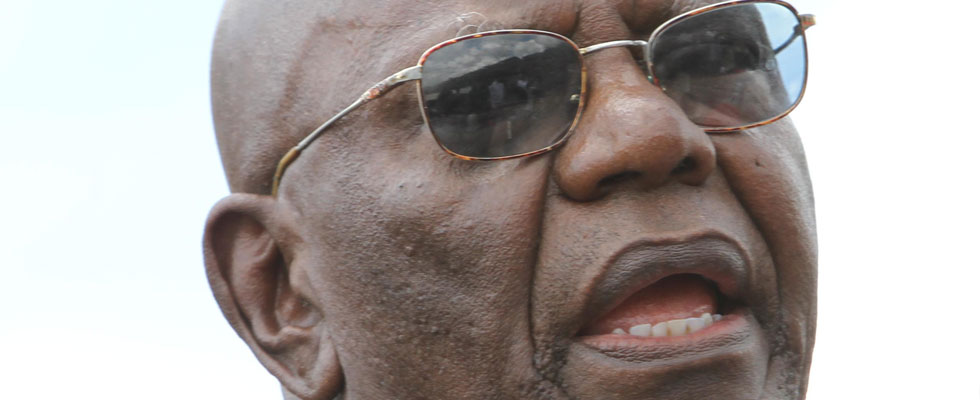
“That is why I have accepted to be here to talk to you (the Press) and if things were being done properly we should have these sort of meetings with you regularly so that we inform you what the party is talking about and what the government is doing,” said Zanu PF secretary for administration and Minister in the President’s Office Didymus Mutasa. He went on to complain about some of the “things” not being done right.
Guest Column by Special Correspondent
“Because all along, we haven’t been allowed to speak to the public Press, and I have only been covered in the Morgan Tsvangirai papers (private Press),” said the ageing nationalist rather ominously, raising two other important questions: one, why should the private Press be synonymous with Tsvangirai and, two, who is so powerful as to prevent the public Press’ access to Zanu PF’s fourth most powerful office holder, who also happens to be a Minister in the President’s Office?
“By taking sides in the Zanu PF wrangle, the public media had abdicated its role,” reported the Daily News, quoting the minister. This begs yet another question: “What is the role of the public media?”
Worse was to come: “I also haven’t been covered well in the public Press, even in pictures of the politburo, I am cut off, I don’t know who is to blame for this, but it is a very unfortunate thing as the public media has been used as instruments in the factional fights.”
Abusing the public-funded media houses is a serious charge. Whoever is to blame for abusing the public Press, using it as a political tool, and adopting Soviet era tricks of removing fallen or those comrades perceived as doomed, from official pictures and public archives, must be weeded out.
Media, Information and Broadcasting Services minister Jonathan Moyo recovered from the faux pas brilliantly, calling upon the so-called “dwarf in huge political robes”, to address the above referred to Press conference.
Sportingly, the Zanu PF official obliged. That is as it should be.
- Chamisa under fire over US$120K donation
- Mavhunga puts DeMbare into Chibuku quarterfinals
- Pension funds bet on Cabora Bassa oilfields
- Councils defy govt fire tender directive
Keep Reading
Mistakes must be accepted and apologies proffered. Only the truth shall set the nation free.
And yet there is a problem. “Things”, as the Mutasa said are not being done right. The Media, Information and Broadcasting Services ministry should ensure that all media houses have equitable access to all ministers and heads of ministries, all political parties and heads of government institutions such as the chief justice, the top brass of the uniformed forces, and above all, His Excellency the President.
At least once or twice a year editors of the weekly and daily papers, regardless of funding origin and upon timely request, should be granted an interview by the Head of State.
The divisions within the Fourth Estate must fall away. Ideologies may differ, but the truth should not. To his credit, the Media, Information and Broadcasting Services minister has called for reform in the industry he oversees.
Bad laws must go. The State really should have no secrets, unless it is up to no good. The Scandinavian countries operate from this premise. The Southern African Development Community should do the same.
Taking candour to a new stage, as the Press ought to do, The Herald’s columnists Nathaniel Manheru recently let go at Confederation of Zimbabwean Industries top brass and their protectionism mantra.
He followed up with a stinging blast at his paralysed political party which needs to confront the truth, if the economy’s woes are to be addressed. These are examples of what the Press should do. At all times it must keep itself at arm’s length from its owners.
It is in the truth and its readers’ interests that its editorial policies must obey and not the flavour of the moment.
Election manifestoes, can just be but fools’ gold. Running a country requires a different mindset and a critical but honest Press. Recently we were told that the banks had mobilised $1 billion for the 2013/2014 agriculture season.
With the entire output of primary agriculture in 2012 having been less than a billion dollars, the banks would have to be foolish to mobilise $1 billion for the next season.
The reported $1 billion mobilised was, therefore, not a patriotic lie, but disinformation, which serves no one.
The Press must guard against such disinformation which serves to delay corrective action at the expense of the economy.
Equally for the privately-owned Press to be known as the “Tsvangirai papers” is inappropriate.
Regardless of what other media houses do, it is the duty of an ethical media house with good governance to be neutral and to uphold its independence at all times.
Deification of political leaders and industrial magnates must be avoided. The Financial Gazette’s editorial of November 28, 2013, took the MDC-T and its leader on, on their practice of “do as I say, not as I do”.
All politicians regardless of political flavour must be held accountable by the media as a whole.
The collapse of the Zimbabwe Broadcasting Corporation has highlighted the dangers of a brazen overtly partisan approach in the media industry. It has also raised the question of how the public-funded media industry must be governed.
It is my view it should be separated from both party and the government, and be expected to earn its keep.
The Media, Information and Broadcasting Services ministry’s role should be to facilitate access by the Press to worthy government activities and not to appoint editors or heads of broadcasting stations.











